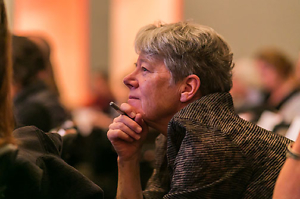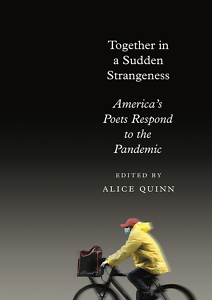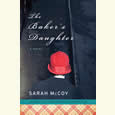Dark Night Will Not Rob You of Your Way
Poets offer their perspectives on the global pandemic in Together in a Sudden Strangeness
Together in a Sudden Strangeness gathers more than 100 poets, whose consummate skill and invaluable insight shed light on the unprecedented experiences of this year’s global pandemic. As COVID-19 case numbers now spike across the country, this collection appears at the exact moment when the nuanced and profound nourishment it offers may be needed most.

Editor Alice Quinn has included poets who run the gamut of race, gender, region, and generation. Stalwart figures in American poetry like Sharon Olds, Yusef Komunyakaa, Eileen Myles, and Billy Collins appear alongside newer voices like Jenny Xie, Tommy Orange, and Nashville native Kamilah Aisha Moon. Read one after another, the diversity of voices represented by these poets reflects the endless variety of circumstances under which people have had to face this worldwide event.
Julia Alvarez considers the future of poetic form itself in Together’s opening poem, “How Will This Pandemic Affect Poetry?”:
Will the lines be six feet apart?
Will these hexameters be heroic like Homer’s?
(Will) (each) (word) (have) (to) (be) (masked) (?)
The 100 poems that follow may offer the beginnings of an answer. Through a wide range of forms, these poems find ways to honor experiences of deep suffering and sacrifice, while also resisting the easy dismissal of small, everyday struggles. They confront the injustices that make some communities especially vulnerable now, while also valuing the intimate observations brought on by the relative peace of domestic lockdown.
Some poets describe the loneliness of missing human contact during periods of social isolation. Some evoke the sense of feeling haunted by those they miss, living or dead. Others convey an altered sense of time passing, a suspension from normality best described by Eliza Griswold: “Every honest answer / is Not Yet.” Still others reveal surprising desires or habits they develop while trapped at home.
 But many of us cannot stay home, and a number of the poems in Together speak to the dangers they face. 2020 Pulitzer Prize winner Jericho Brown writes: “The people who work at the grocery don’t care. / They say, Thank you. They say, Sorry, / We don’t sell motor oil anymore with a grief so thick / You could touch it. Go on. Touch it.” Amit Majmudar’s “An American Nurse Foresees Her Death” gives a harrowing picture: “I stepped out of a killzone shaped like a bedroom / then went home to sleep in my garage. / This hand that sponged the fever off a body / waves at my kids through the living room window.”
But many of us cannot stay home, and a number of the poems in Together speak to the dangers they face. 2020 Pulitzer Prize winner Jericho Brown writes: “The people who work at the grocery don’t care. / They say, Thank you. They say, Sorry, / We don’t sell motor oil anymore with a grief so thick / You could touch it. Go on. Touch it.” Amit Majmudar’s “An American Nurse Foresees Her Death” gives a harrowing picture: “I stepped out of a killzone shaped like a bedroom / then went home to sleep in my garage. / This hand that sponged the fever off a body / waves at my kids through the living room window.”
Numerous poets address the undercurrents of violent racism that have aggravated the pandemic-era suffering of millions in our country. These poems include references to rising hostility toward Chinese Americans (Sally Wen Mao’s “Batshit”) and to systemic oppression of indigenous communities (Tommy Orange’s “Aftermaths”). Claudia Rankine’s stunning “Weather” evokes the killing of George Floyd and subsequent protests around the world.
Rather than indulge any longing to return to “normal,” these poets recognize that our post-pandemic future lies somewhere new, as yet undefined. Major Jackson, who recently joined the faculty of Vanderbilt University, acknowledges our current sense of dislocation in “Invocation”: “Down here, we’ve inherited an arcade of stars / and want kindness that can stop a bomb.” Jackson goes on to describe a series of desires — for the vanishing of “rallies of hate”; for a dance floor where we can touch “the tips of each other’s fingers / streaming their ambient light.” But for now, the future remains unknown: “Such were the new births of ourselves / breaching horizons like a sting.”
Given its subject matter, Together suggests a collective experience of staggering complexity. But out of its many perspectives rises a cumulative impression more focused than that complexity suggests. From these poets’ voices emerges a powerful drive toward fuller, humbler understanding of the role we each play, individually, in a much grander picture.
Susan Stewart writes of this deep reckoning in “Three Octets”: “One thing will clarify another, / and dark night will not rob you of / your way, and the sun will not blind you, / or the river drown you, until you see / deeply into the final rule of nature.”
Both cathartic and challenging, Together in a Sudden Strangeness provides an early glimpse into how literary writers will discover new form and language to convey the unfolding perils of this unprecedented time. In these poems, we experience the enduring capacity of the human imagination to locate meaning, beauty, and witness — even in the direst circumstances.

Emily Choate is the fiction editor of Peauxdunque Review and holds an M.F.A. from Sarah Lawrence College. Her fiction and nonfiction have appeared in Mississippi Review, Shenandoah, The Florida Review, Atticus Review, Tupelo Quarterly, Bayou Magazine Online, Late Night Library, and elsewhere. She lives near Nashville, where she’s working on a novel.


